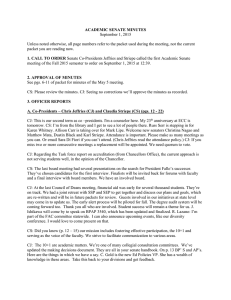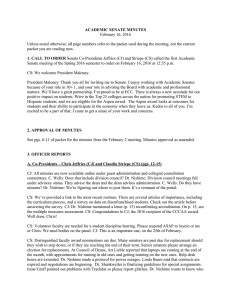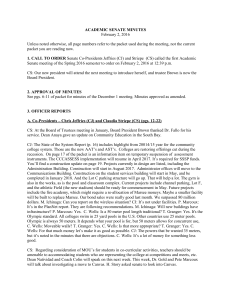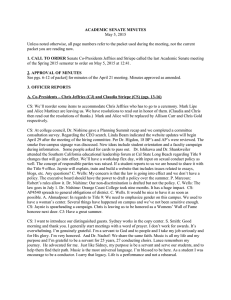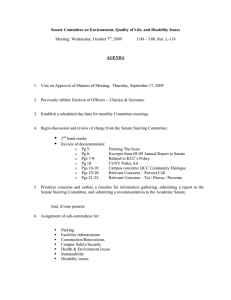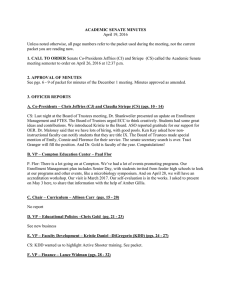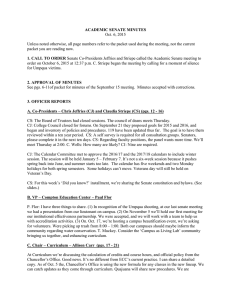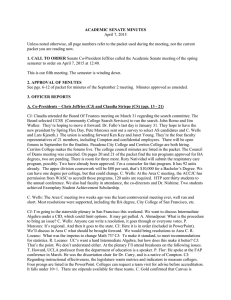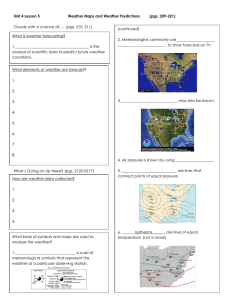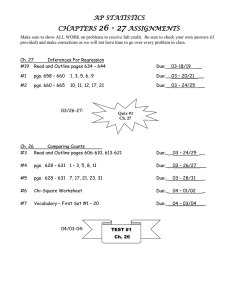ACADEMIC SENATE MINUTES November 17, 2015
advertisement
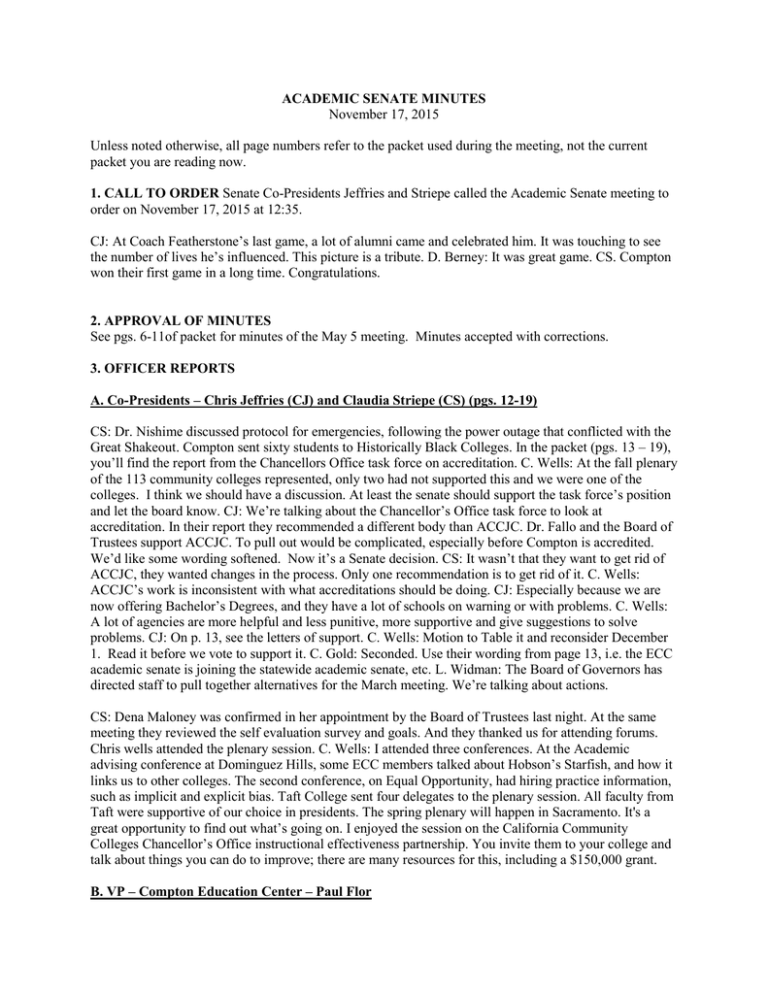
ACADEMIC SENATE MINUTES November 17, 2015 Unless noted otherwise, all page numbers refer to the packet used during the meeting, not the current packet you are reading now. 1. CALL TO ORDER Senate Co-Presidents Jeffries and Striepe called the Academic Senate meeting to order on November 17, 2015 at 12:35. CJ: At Coach Featherstone’s last game, a lot of alumni came and celebrated him. It was touching to see the number of lives he’s influenced. This picture is a tribute. D. Berney: It was great game. CS. Compton won their first game in a long time. Congratulations. 2. APPROVAL OF MINUTES See pgs. 6-11of packet for minutes of the May 5 meeting. Minutes accepted with corrections. 3. OFFICER REPORTS A. Co-Presidents – Chris Jeffries (CJ) and Claudia Striepe (CS) (pgs. 12-19) CS: Dr. Nishime discussed protocol for emergencies, following the power outage that conflicted with the Great Shakeout. Compton sent sixty students to Historically Black Colleges. In the packet (pgs. 13 – 19), you’ll find the report from the Chancellors Office task force on accreditation. C. Wells: At the fall plenary of the 113 community colleges represented, only two had not supported this and we were one of the colleges. I think we should have a discussion. At least the senate should support the task force’s position and let the board know. CJ: We’re talking about the Chancellor’s Office task force to look at accreditation. In their report they recommended a different body than ACCJC. Dr. Fallo and the Board of Trustees support ACCJC. To pull out would be complicated, especially before Compton is accredited. We’d like some wording softened. Now it’s a Senate decision. CS: It wasn’t that they want to get rid of ACCJC, they wanted changes in the process. Only one recommendation is to get rid of it. C. Wells: ACCJC’s work is inconsistent with what accreditations should be doing. CJ: Especially because we are now offering Bachelor’s Degrees, and they have a lot of schools on warning or with problems. C. Wells: A lot of agencies are more helpful and less punitive, more supportive and give suggestions to solve problems. CJ: On p. 13, see the letters of support. C. Wells: Motion to Table it and reconsider December 1. Read it before we vote to support it. C. Gold: Seconded. Use their wording from page 13, i.e. the ECC academic senate is joining the statewide academic senate, etc. L. Widman: The Board of Governors has directed staff to pull together alternatives for the March meeting. We’re talking about actions. CS: Dena Maloney was confirmed in her appointment by the Board of Trustees last night. At the same meeting they reviewed the self evaluation survey and goals. And they thanked us for attending forums. Chris wells attended the plenary session. C. Wells: I attended three conferences. At the Academic advising conference at Dominguez Hills, some ECC members talked about Hobson’s Starfish, and how it links us to other colleges. The second conference, on Equal Opportunity, had hiring practice information, such as implicit and explicit bias. Taft College sent four delegates to the plenary session. All faculty from Taft were supportive of our choice in presidents. The spring plenary will happen in Sacramento. It's a great opportunity to find out what’s going on. I enjoyed the session on the California Community Colleges Chancellor’s Office instructional effectiveness partnership. You invite them to your college and talk about things you can do to improve; there are many resources for this, including a $150,000 grant. B. VP – Compton Education Center – Paul Flor C. Chair – Curriculum – Allison Carr (pgs. 20 - 23 ) Nothing new to report. We’re continuing to move curriculum through process. D. VP – Educational Policies –Chris Gold (pgs. 24 - 25) C. Gold: Chris Jeffries chaired our last meeting. We will have readings later. You’ll see AP5070 (attendance) in the minutes, and 5530 (Student Rights and Grievances) was discussed here. We talked about protecting faculty. I spoke with the union and William Garcia who has a second draft. Most of your concerns were met in revisions. E. VP – Faculty Development – Kristie Daniel –DiGregorio (pgs. 26 - 29) KDD: Dustin nominated Kim Nguyen, and we’ll recognize her at the December meeting. Getting the Job was well attended. The video and handouts will be available on the PD website. Our next one on January 29 will be our second workshop. We want to stay ahead of the search. FDC talked “making decisions.” Even though we’re not a collegial consultation committee, FDC is faculty driven, and messaging conscious. We want to be positive, and not something pushed upon faculty. Your minutes say “contract” not “plans” which is more appropriate. We want to energize faulty before that last minute rush in May. More proactivity will be good for everyone. We want the plan to be broad. When Jaynie Ishikawa came she said she has a statement for our syllabi. FDC will look at it and make it user friendly and send it to faculty at the end of the semester for you. We want you to feel equipped and supported. M. Ichinaga: Would you take an idea to FDC? One of our librarians is getting tenure. We have no recognition event for this on campus. I know FDC loves a change in status. KDD: We recognize the Associate Professor level, but I’ll take it back to the team. M. Ichinaga: Would administration consider a ceremony? C. Wells: Or acknowledgement on flex day? CJ: With out new hires we’ll have a lot. B. Jaffe: it would change the ethos to celebrate anything, let alone something of magnitude. F. VP – Finance – Lance Widman (pgs. 30 - 32) pp. 30-32, 10/29 PBC Minutes: Some good discussion of the Employee Feedback survey 2011-2015 regarding PBC activities, Faculty Hiring, Foreign Students’ recruitment incentives. J. Troesh is stepping up to shadow LW as senate PBC rep. Emily radar retires this spring, and I retire next year. Thank you Josh. C. Wells: Regarding the bond sales, are these new initiatives or existing bonds? L. Widman: Same bonds at a lower interest rate. G. VP – Academic Technology – Pete Marcoux I’ve invited Art Leible to speak. The main thing is the laptops. Faculty development will get models so people can see. The default choice is laptop. M. Abbani: The tablets come with docking stations, monitor, and keyboard. P. Marcoux: The tablet comes with a case with a keyboard. A. Gallaghar: What’s the advantage of the tablet? P. Marcoux: Portability. L. Widman: Opportunities for information? P. Marcoux: Professional development talked about making a cheat sheet. C. Wells: When will we see them? P. Marcoux: Probably after Christmas. I met with Mr. Leible. H. VP – Instructional Effectiveness/ Assesment of Learning Committees and SLO’s Update – Russell Serr (pgs.33-36) Program review meets once or twice a week. Hundreds of assessments are trickling in. 4. SPECIAL COMMITTEE REPORTS A. ECC VP of Academic Affairs and ECC VP of Student and Community Advancement – Jean Shankweiler and Jeanie Nishime J. Shankweiler: Idania Reyes will speak more on the Student equity plan later today. We have a rough first draft. The template is 85 pages. Senate should review it. It’s submitted December 18. We have a new Dean of Natural Science, and have hired several associate deans, and have added a few more faculty positions. The Distance Ed Committee is hosting an event Friday. One issue is migrating to canvas. The DEAC has to look at it. Our school could pilot it by spring. My opinion is we’ll have to switch eventually. P. Marcoux: How about a flex day discussion on canvas? Dr. Shankwieler: We have to let them know before flex day. P. Marcoux: Is the school ready to follow both? Dr. Shankwieler: We could investigate that. C. Gold: Pat James from OEI will be there Friday. Dr. Nishime: The accreditation visit went well. We have the draft and the report is favorable. We can’t release it yet. I represented the president at a UC Summit. Janet Napolitano and Francisco Rodriquez were present. The UC is admitting more transfer students, 5000 for Fall 2016. They’re lessening emphasis on international students. This is a good year to apply to the UC. It's a major step forward. This is a change from years past. They are recognizing that our students do well when they transfer. They plan a 2 :1 ratio of freshman to transfer students. I’m encouraged by the dialogue. C. Wells: The UC’s were interested in our transfer degrees at a recent conference. R. Lozano: The pathway doesn’t have a commitment yet, but it's a good start to develop one set of courses. They are growing and committing to transfer students, and have even curbed freshman admissions. 5.UNFINISHED BUSINESS A. Election of Officers and Senators –Call for nominations. P. Marcoux: We’re still waiting for nominations for president. Please let us know if interested. And on the front of your packet, if you have “15/16” beside your name, someone in your division must run an election. Fine arts falls in this category. It's a three-year commitment. B. BP/AP 4240 – Academic Renewal – Chris Gold This is a clean-up and Title 5 update for this policy and procedure, and this is the second reading and will be brought to a vote. (pgs. 37 – 39) P. Marcoux: Move to approve. C. Wells: second. C. Gold: Any questions on this? Hearing none, are there any questions on the procedure? M. Ichinaga: It should be administrative, not an academic procedure. CS: Renewal shall be granted only once. Dr. Nishime: That language is in Title 5. CJ: We’re more liberal than other schools. Number six was added as a compromise, and addresses whether a student can apply for renewal if they have already received an AA degree. They can appeal. Now a student can petition. R. Lozano: This addresses our concerns in counseling. An after degree conference is key. Life brings them back to transfer. What about individual semester vs. overall GPA’s being 2.5? We clarified the language. CS: Under what circumstance is it irreversible? CJ: A “D” grade, once renewed, cannot be overturned. C. Gold: We can go to vote for them as a package with one typographical correction. Vote was unanimous. See Roster for “aye” votes. C. A/P 5530 – Student Rights and Grievances – Chris Gold This procedure has updated language regarding student rights and grievances. There is no corresponding board policy. This will be brought back after further discussion with William Garcia and the Union 6. NEW BUSINESS A. BP/AP 3710 - Securing of Copyright – Chris Gold This is a new policy and procedure that was brought forward by the Copyright Committee. This will be the first reading. (pgs. 40 – 44) C. Gold: This one is securing copyrights. The district will manage copyrights. It’s right out of the CCLC template. J. Shankweiler: Is this a new policy? It didn’t make it to the council of deans. C. Gold: These should be approved by deans. CS: Who is the board of governors? Let’s change it to ECC Board of Trustees. C. Wells: Leave it so it covers Compton. Dr. Nishime: There should be a separate policy for Compton. C. Gold: So we’ll specify ECC. According to contract, I own copyright, unless the college provides $2000 or more than $5000 in support materials. The other issue is how we use copyright as instructors. The law is not clear. Our contract is very clear. Don Brown says our language is good compared to other colleges. M. Ichinaga: The procedures developed by the superintendent, does it imply we have a copyright officer? Does the committee become a standing committee? CJ: We decided at Ed Policies not to change it; it’s across campus and not just with faculty. J. Troesh. In regards to the BP and AP, are we dealing with copyright or all intellectual property, i.e. trademarks, inventions, school logo? We’re only covering three areas of intellectual property law. This is intellectual property, not copyrights too, or this is limited. C. Gold: On p. 43, it has intellectual property listed. Maybe you could explore this for us? C. Wells: The procedure should be more explicit. P. Marcoux: if you create an online class, the district can use it if you get more than $2000 dollars. C. Gold: They don’t count general expenditures, like computers. CS: In the BP, what materials would the district own? C. Gold: If they pay me for something specific they own copyright. P. Marcoux: Does release time count? CJ: No. C. Wells: What about external grants? CJ: It’s covered on pg. 42. C. Gold: It’s also under part D. C. Wells: If it’s on a grant you still own it. J. Troesh: Language again; is it students and employees? What about student works? Is this just for employees? B. BP/AP 3750 – Use of Copyrighted Materials – Chris Gold. These are revisions of the policy and procedures for use of copyrighted materials. There is no CLCC template for the policy; however, we are keeping the policy with one revision. The procedure has been updated to clarify the Fair Use Checklist. This is a first reading. (pgs. 45 – 55) C. Gold: We need to review BP’s and get them on a cycle. Dr. Nishime: Ten years is fine. C. Gold: We might bring things forward that don’t have changes. Questions? CJ: There is no template for this. C. Wells: What about peer to peer sharing, like with dropbox? P. Marcoux: Those are under this too. When laws change we have to update. C. Wells: You can add a reference to current law as an appendix. CJ: we did that here, p. 51. C. Gold: It’s standard for language to defer to law. On pg. 49, previously there was a form for copycenter, a big checklist for every order, now it’s just copyrighted materials. Questions? Email me. We’ll bring this back for second reading with your feedback. 7. INFORMATION ITEMS –DISCUSSION A. Idania Reyes – SEP (pgs. 56 – 59) I. Reyes: The student equity plan submitted last December had a different feeling in the early stages. The Chancellor’s Office gave us a template in august, 85 pages. We received 52 proposals for funding. So far there is 2.1 million dollars received this year, but 3 million in requests. We are still revising the template. Equity is different from equality. Students come with differences. Equity looks at the gaps, and meets them to make students successful. It’s data driven and division specific. The equity plan is on the next page. We coordinate with EOPS, CalWORKs and other programs. The next slide looks at five success indicators listed here. (See slides.) We break down our data sets to track specific demographics. What activities are we allowed to engage in? The next slide looks at course completion. Notice that there are equity gaps for different races. We have lost courses due to students not completing. It's a loss of FTES, and a loss of money. The next one is a snapshot about Basic Skills completions. This is a six-year analysis. Lastly, we’re tackling equity by looking for commonalities among requests. We’re focusing on PD, sharing best practices, and learning about cultural sensitivity. We’re combining things into sections. Then breaking it down by an institution. The last page talks about funding, collegial consultation, and we’re hoping to get to the Chancellor’s Office by December 18. CJ: The senate must sign off on this. We will send you the link. Claudia was on the original committee. We appreciate your work Idania. 8. FUTURE AGENDA ITEMS A. Lori Suekawa – CI-D and Assist 9. PUBLIC COMMENT 10. ADJOURN The meeting adjourned at 1:57 pm. SD/ECCFall15
